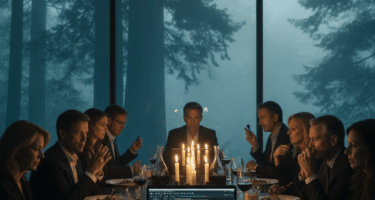It was a Thursday night at Rosewood, the unofficial parliament of Palo Alto. The mood was unusually nostalgic — not for a product launch or an IPO anniversary, but for a president.
Mr. X swirled his drink, eyes reflecting the amber glow of the bar’s designer Edison bulbs. “You know,” he said, “the market was alive back then. Every tweet was a stimulus package.”
Across the table, Sasha — a venture capitalist who refers to herself as a “chaos metrics analyst” — nodded solemnly. “Exactly. Trump was volatility-as-a-service. Regulation today is so… linear. We used to have emotional whiplash. That’s what drove creativity.”
Leo, a product manager whose main product is burnout, chimed in: “I remember checking Twitter during standup just to see what the market thought about my existence. Now we get monthly policy briefings instead of adrenaline.”
There was laughter, but also a strange sincerity — the kind that only comes from people who’ve survived both IPOs and therapy.
“You’re all missing the point,” said Mr. X. “It’s not about politics. It’s about dopamine. We were all junkies for disruption, and Trump was the perfect dealer. Every executive meeting felt like a launch event.”
Sasha leaned forward. “I’ll say it. The chaos kept valuations spicy. You couldn’t model it. You had to feel it. That’s why founders were gods. Now everything’s compliance and ESG reports. You can’t 10x morality.”
Leo sighed. “The new guys think predictability is leadership. They don’t realize stability is bad UX. The whole point of Silicon Valley was to break things.”
A government liaison at the table — whose job title might as well have been “Buzzkill-in-Chief” — gently interrupted. “So, just to confirm, you’re nostalgic for a time when uncertainty ruled the markets, democracy was a beta test, and every day felt like a product recall?”
“Exactly,” said Sasha, smiling. “It was beautiful.”
Mr. X raised his glass. “To the chaos dividend. May it rise again.”
Somewhere between irony and sincerity, the toast landed. Because deep down, they didn’t miss Trump the man — they missed the permission he gave them to believe that disruption was a moral philosophy.
In the Valley, the real addiction was never power. It was the thrill of getting away with it.



Leave a Reply